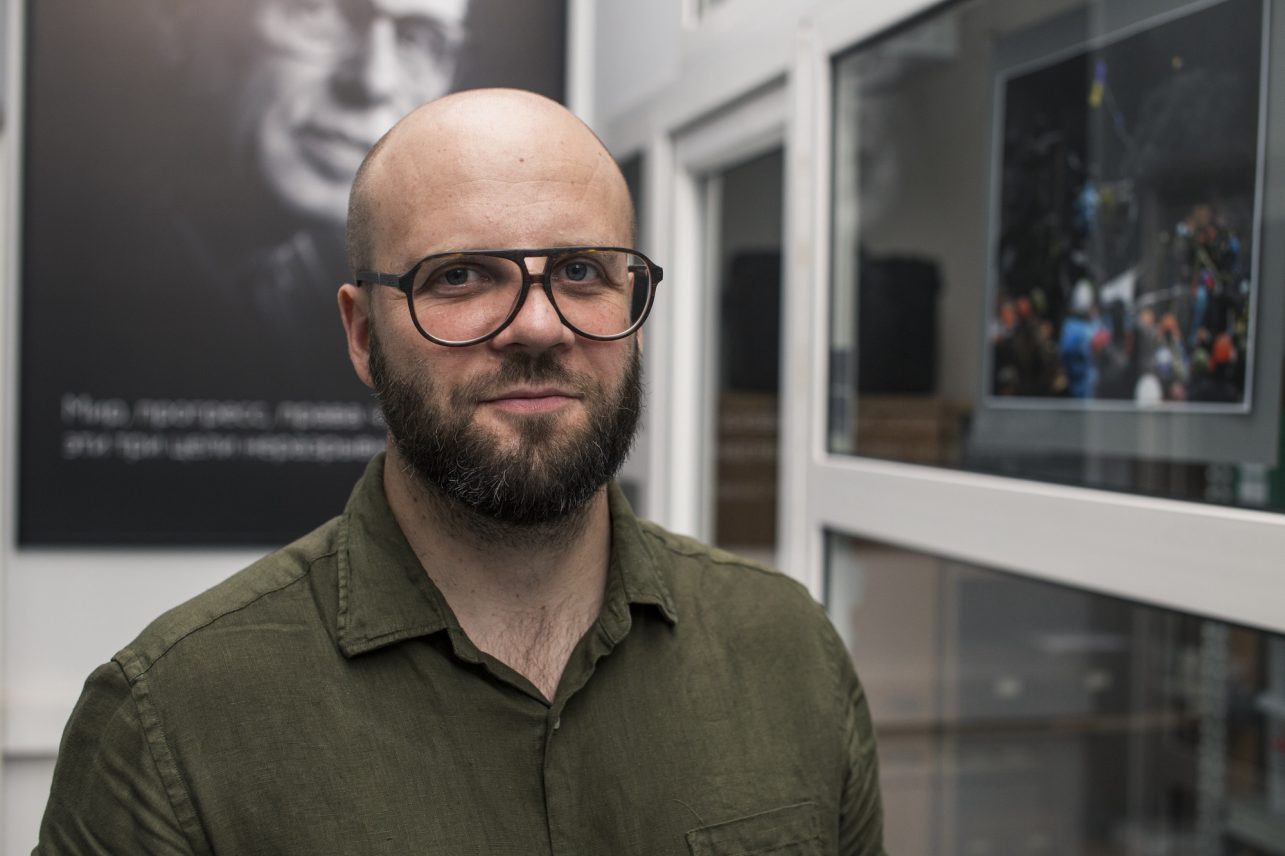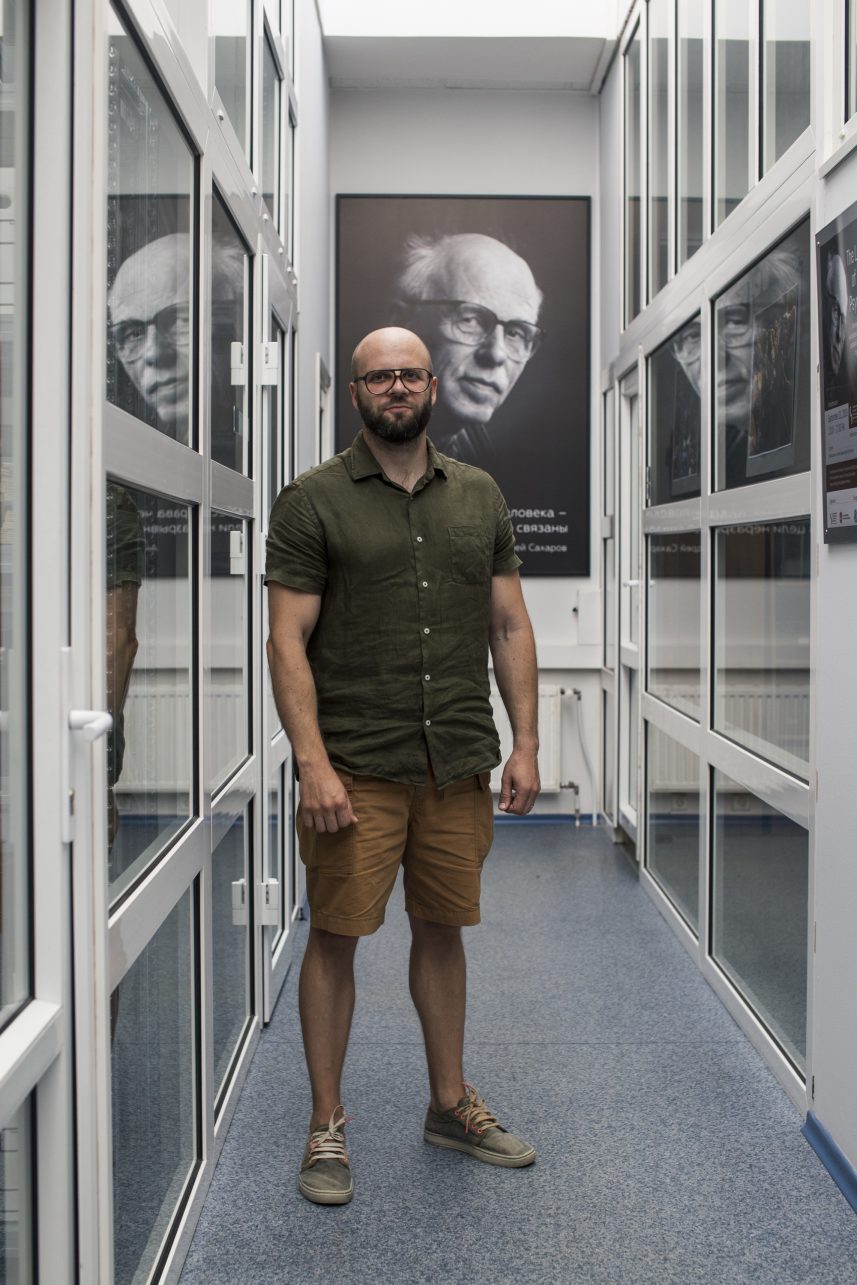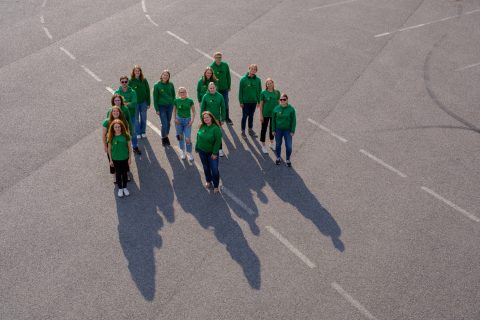Old books, piles of new and old documents, many shelves – none of them empty – and a full desk. This is how Dr. Dainius Genys’ office at Andrei Sakharov Research Centre for Democratic Development looks like.

The Russian physicist, whose centenary is commemorated this year, was a Nobel Peace Prize winner in 1975, formerly known as the inventor of the hydrogen bomb, who worked in the Soviet Union. Worried about the consequences his discovery will have for the future of humanity, he began to speak publicly about the dangers of a nuclear arms race.
The center, named after a human rights activist and dissident, was established at the Vytautas Magnus University in Kaunas, at the Student Square beloved by the young people. “If we want to live the way we really want to, then we must act accordingly and fight for our rights. If we think that some institution or government will do it for us, I have to say that it won’t,” Dainius offered a sincere advice when talking about human rights and democracy.
Sociologist Dr. Dainius Genys warmly agreed to tell me about the feats of Andrei Sakharov and the center named after him. He started working at the Sakharov Centre was soon as it was opened. The center opened its doors in December 2017 and began to nurture and glorify Sakharov’s legacy. One of the reasons why the center was opened at Vytautas Magnus University is the fact that the topics of democracy, human rights and freedom have been researched here for a long time.
Dainius Genys is pleased that despite being four years old, Andrei Sakharov Research Centre for Democratic Development has already had a solid number of events. The center not only collects information and archives from around the world, but it also conducts research and analyzes the human rights situation in the Eastern European region and post-Soviet countries. The center is also actively involved in academic activities, organizing two international conferences every year: the Sakharov Conference in Vilnius in May, and the Leonidas Donskis Conference in Kaunas in September. Various leadership seminars are also organized, and they are very popular among foreign students. According to the interviewee, the center kindly cooperates and accepts the proposed ideas, includes them in its program, and actively works with the interns. “We also engage in publishing, we publish reports, an now, during the Sakharov’s centenary, we are publishing a special issue of the magazine Darbai ir dienos. It will focus on Sakharov’s legacy, ideas and related reviews of today’s phenomena,” Dainius says happily.
When there is a lack of mutual love and empathy in society, when there is no communication, then it is very easy to speculate and manipulate the concepts.
“Sakharov’s name is huge, his ties with Lithuania are also obvious. Perhaps the best-known fact is that he was awarded a Nobel Peace prize in 1975 but the government did not let him travel and accept it. Instead of staying at home, he came to Vilnius, where the trial of his friend Sergei Kovalev was taking place at the time, but he was also refused entry to the trial. For a few days (while the trial was going on), Sakharov came to the door and waited, thus showing his respect. Of course, Lithuanian activists and dissidents also gathered there. Later, encouraged by Sakharov, they founded the Lithuanian Helsinki Group, which had a significant impact on the nurturing of Lithuanian awareness and democracy. He constantly advocated the restoration of Lithuania’s independence, supported dissidents in Lithuania and elsewhere. This is probably one of his qualities that has impressed the activists both then and now.
This personality never put himself first, always spread humanistic ideas, and used his standing to provide support for others. If he saw that someone was being abused or something bad was happening, he went there if the situation allowed, issued calls and so on. Prior to the persecution, Sakharov belonged to a narrow, closed circle of the Soviet elite. He had the opportunity to talk directly to Nikita Khrushchev – it was quite an impressive thing at the time. And he was able to use that authority for good purposes rather than to create his own well-being. After receiving attention from the public, the media or other countries, he always – speaking in modern terms – passed the ball. One example: In 1988, Gorbachev called Sakharov in Gorky, where he was exiled for seven years and said, “You can return now.” Sakharov thanked Gorbachev for his concern and took the opportunity to say that his friends, who had been imprisoned in Gorky for fighting for freedom of speech, had their cases fabricated, so he asked for this injustice to be rectified. Another person would have been stoked after many years of exile and would have started packing to go home but Sakharov always paid attention to the situation of others,” Dainius Genys shared stories about Andrei Sakharov.
Listening to these stories, I thought about the world we live in today. How can it be that with all the examples of how people fought for equality and freedom, we can often feel like on the battlefield when we take to the streets today. A war in which people use emotional and psychological violence against the other. I also asked Dainius what he thinks about the polarization taking place in society these days. The interviewee acknowledged that human rights could and should be the common ground for communication that is so lacking today between the two opposing sides. “The problem is that the concept of human rights is taken by different sides and interpreted in a very different way, not always taking into account the interests of the other side. When there is a lack of mutual love and empathy in society, when there is no communication, then it is very easy to speculate and manipulate the concepts,” D. Genys said.

I wondered what motivates and inspires Dainius to work in this field – to build up Sakharov’s legacy, to work with so many documents, to talk about topics that are not convenient for everyone, to raise issues and analyse the human rights topic that is so sensitive and fragile for each of us. |Sakharov himself is an inspiring example. Stories of how he lived and what worries and challenges he faced, how he maintained his moral integrity and did not break despite the troubles he encountered, all that – shakes you up. You understand that, unlike the hero of modern comics, you may not have superpowers, but superpower is a sincere concern for the fate of humanity, a noble moral culture that permeates your inner and daily decisions. Sakharov’s determination, fortitude, sacrifice for others, without thinking about himself or putting his idea above others, is an example that was relevant then and remains relevant today.”



